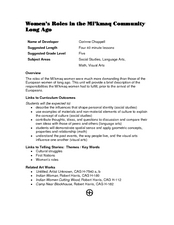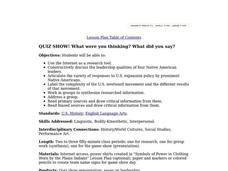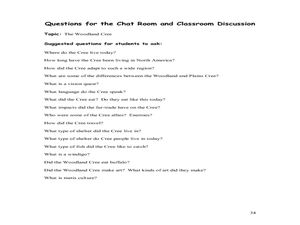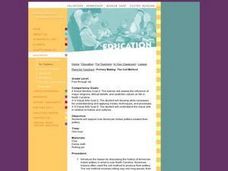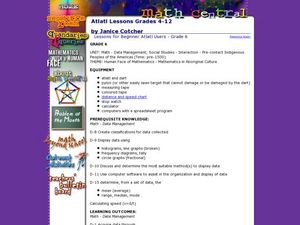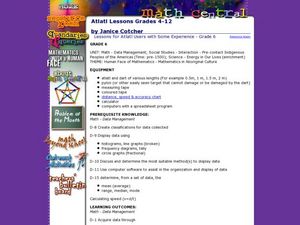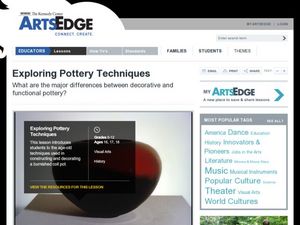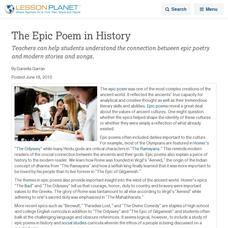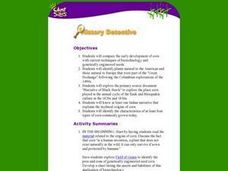Alabama Learning Exchange
Exploring Explorers
Students gather information about a 15th to 17th century explorer and prepare a script in talk show format about the individual. Finally, students make a video following the script and present it to the class.
Curated OER
Women's Roles in the Mi'kmaq Community Long Ago
Fifth graders examine the roles of Aboriginal women in their community long ago. They explore the different roles Aboriginal women portray in today's society. They address any stereotyping they may have regarding Aboriginal people.
Curated OER
Creating Stories Using Pictographs
Fourth graders research pictograph stories written by Native Americans. They investigate the history behind pictographs, and look through a reference book identifying the different pictures. The teacher then create their own individual...
Curated OER
What's in a Name? The Use of Native American Images in Sports
Students discuss and analyze the pros and cons of using Native American names and images to represent sports teams. Using primary sources, including position statements from Native American tribes, interviews with school alumni and...
Curated OER
The Buffalo: A Way of Life for the Plains Indians
Eighth graders complete a KWL chart on the Plains Indians. After watching a video, they state the difference between legends and facts about the importance of the buffalo to Native Americans. They also practice their note-taking skills...
Curated OER
Yo-ho, Yo-ho a Viking's Life for Me
Students complete a unit of lessons on the Vikings. They analyze maps, read and discuss myths, summarize the main ideas from resource materials, watch videos, sing a song, draw a picture to illustrate Norse mythology, and define key...
Curated OER
HIV/AIDS in Our Spanish-Speaking Community and the World
Learners study the HIV virus and how it has impacted the hispanic community. In this infectious disease lesson students discover how HIV/Aids is found all over the world, what misconceptions are out there and what kinds of treatments...
Curated OER
QUIZ SHOW! What were you thinking? What did you say?
Students participate in a game show to share the information they have uncovered about the US expansion policy and how it affected Native Americans.
Curated OER
Great Basin Tribes- Use of Land for Sustenance
Students explore four Native American tribes from Nevada. In this Native American history instructional activity, students identify and generate important corresponding attributes of the Southern Paiute, Northern Paiute, Washoe, and...
Curated OER
Religion and Globalization
Students consider the influence of religious values in global perspectives. In this global issues instructional activity, students research noted articles and documents about globalization, discuss the implications of living in a global...
Curated OER
Sand Painting Mural
Third graders design and create classroom sand painting mural which is comprised of individually designed pieces.
Curated OER
Inference By Analogy
Students infer the use or meaning of items recovered from a North Carolina Native American site based on 17th-century European settlers' accounts and illustration.
Curated OER
Trading Rendezvous
Students explore the fur trade between the settlers and Native Americans. Through class discussion, students explain and give examples of how the fur trade worked. In groups, they simulate the fur trade using materials provided by the...
Curated OER
Researching North American Tribes: The Cree
Students research the Cree tribe of North America. In this Native American lesson, students will research on-line, then compare and contrast the differences between the Cree tribe and other Native American tribes. Students will break...
Curated OER
Southeastern Native Americans' Lifestyles
Young scholars complete activities to learn about Southeastern Native Americans. In this lifestyles lesson, students watch a PowerPoint about Southeastern Native Americans, view artifacts from the region and discuss the objects with a...
Curated OER
Pottery Making: The Coil Method
Students discuss the history of Native American pottery in North Carolina. They explore the coil method of making pottery and make their own creations implementing the coil method. They can allow the pots to dry or have them kiln-fired.
Curated OER
Understanding Political Cartoons
Students draw two political cartoons. They compare the Wounded Knee Massacre of 1890 to the stand-off that took place at Wounded Knee in l973. They examine the role that Manifest Destiny played in the West.
Curated OER
Market Simulation
Students explore the role of markets in Asian countries. They bring items from home to barter with to simulate markets. They discuss the advantages and problems of exchanging and how price is determined.
Curated OER
Atlatl Lessons Grades 4-12: Lesson for Beginning Users of Atlatl
Sixth graders determine the mean, range median and mode of a set of numbers and display them. In this data activity students form a set of data and use computer spreadsheet to display the information. They extend of the process by...
Curated OER
Lessons for Atlatl Users with Some Experience-Grade 6
Sixth graders experiment with an atlatl and dart. In this sixth grade data management mathematics instructional activity, 6th graders explore and determine the most suitable methods of displaying data collected from their...
Curated OER
Exploring Pottery Techniques
Students examine Native American pottery. In this visual arts lesson, students analyze burnished and glazed clay pots. Students study how to create pots from online sources and respond to questions about the process. Extension activities...
Curated OER
The Epic Poem in History
Teachers can help students understand the connection between epic poetry and modern stories and songs.
Curated OER
History Detective
Middle schoolers study the effects of the Great Exchange on the Americas.
Curated OER
Treaty Trail: Historical Perspectives Point of View
Students research the point of view of key figures present at the Walla Walla Treaty council. Students analyze primary and secondary sources to determine how various groups of people involved in the treaty council viewed the events as...



